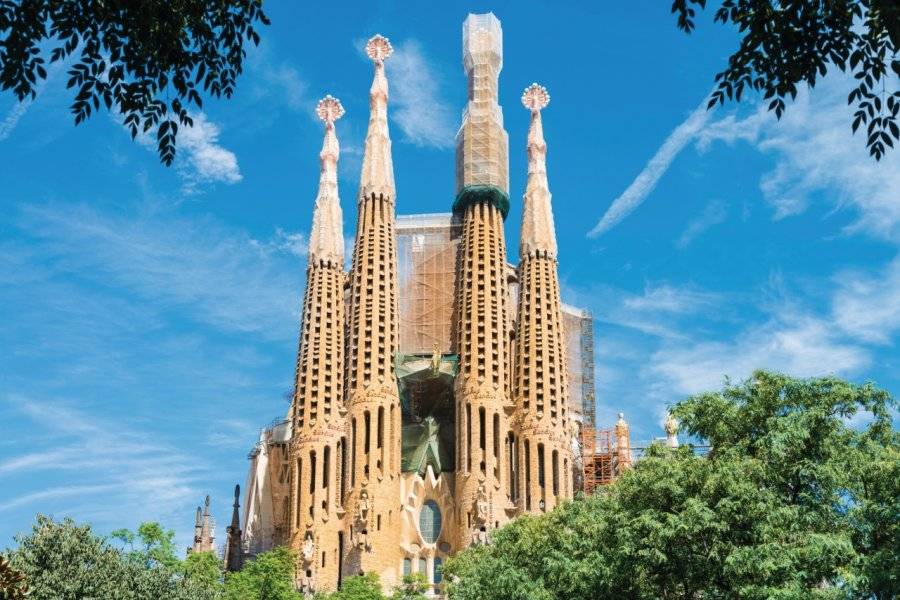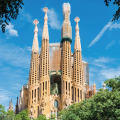SAGRADA FAMÍLIA
Gaudí's ultimate masterpiece, this basilica is the most visited monument in Spain! The project is expected to be completed in 2026.
The Sagrada Família, a UNESCO World Heritage Site, is an exceptional church, the work of the brilliant architect Antoni Gaudí. Today, more than 140 years after the laying of the first stone, the basilica is still under construction. It is an exceptional temple that you must visit! Gaudí has indeed created a grandiose masterpiece, composed of 18 towers, rising to different heights and three main facades, true representations of the Bible carved in stone, in the open air. The one of the Nativity, dedicated to Christ, enjoys an exuberant decoration, while the one of Passion, which represents the suffering of Christ, is much simpler. Finally, the facade of the Glory reveals a monumental representation of the Last Judgment, the Glory but also Hell. But it is important to know that it was the architect Francisco de Paula del Villar who, in 1882, undertook the construction project of the Sagrada Familia. He proposed a neo-Gothic style with pointed windows, buttresses and a slender bell tower. After disagreements of a technical nature, it is Gaudí who takes over. He presented a project of great ambition. March 19 of that year marked an important event: the first stone of the building was laid by Bishop Urquinaona. The work progressed well, and in 1885 the first masses were held in the chapel of St. Joseph, located in the crypt, where Gaudí's body now lies. From 1914 onwards, Gaudí devoted himself exclusively to this architectural work until his accidental death in 1926, when he was hit by a bus. While the Sagrada Familia was truly the masterpiece of his life and occupied all his thoughts and energy (note that he even slept on the spot, his work bordering on obsession), the bell tower of the Bernabé Apostle is unfortunately the only one he was able to see completed. Following the death of the architect, the path is still full of pitfalls and the Spanish Civil War, from 1936 to 1939, did not spare the construction project of the building. Indeed, the Sagrada Familia was subject to acts of vandalism, the models were destroyed, the plans and photographs burned. Nevertheless, after the war, the architect Francesc de Paula Quintana decided to take over the direction of the work, despite the magnitude of the task. He set about reconstructing the project with the little material he had saved. His efforts were not in vain, since in 1952 the façade of the Nativity was illuminated for the first time. Several architects followed, all of them respecting Gaudí's project. We owe them, in 2010, the construction of the naves, columns, vaults, transepts, crossing, apse and main facade. That same year, Pope Benedict XVI consecrated the minor basilica and the nave received the City of Barcelona Prize. Over the years, the towers are gradually raised, one after another, so that in 2021, the tower of the Virgin Mary, decorated with the famous mosaics trencadís, is inaugurated and the star that crowns it is placed in a moving celebration. With 138 meters high, it is the second tallest tower in the building, after that of Jesus, which rises to 172.50 meters. The city of Barcelona hopes to inaugurate the architectural complex of the Sagrada Familia, a titanic masterpiece if ever there was one, in 2026, on the centenary of the death of Gaudí, a genius architect with an impressive artistic sensibility. The history of this interminable construction deserves to be known, but nothing beats a visit to realize the splendor of the building. The entrance is expensive, as part of the money is donated to the works, and you will have to book in advance to avoid the long hours of queue at the entrance. But, once inside, you will be overwhelmed, having certainly not seen anything like it before, regardless of your religious beliefs. The first impression that comes to mind when entering the Sagrada Familia is its majesty: the size of the temple itself but also the height of the vaults of the columns, the countless plays of light created by the stained glass windows, etc. The Sagrada Familia is a fairy world, a real forest of palm trees - nature having always been Gaudí's main source of inspiration -. The columns that line the nave, as you will see, are the trunks among which you will walk, inviting you to the calm of reflection and contemplation. Among the most remarkable elements, look at the golden triangle of the presbytery, visible from the door of the Glory. Framed by a large hyperboloid, it symbolizes the Eternal Father and was created by Jordi Bonet. Sculpted on the door of the Glory, you can read the Our Father in large letters, which is available in 50 languages. At hand level, as if to open the door, Antoni's "A" and Gaudi's "G" are revealed before your eyes. Finally, you must admire the stained glass windows. In the morning they illuminate the interior of the temple with pale and rather cold colors. But, as the day progresses, the light passes through the stained glass windows with warmer tones, radiating on the immense columns. As you can see, each visit to the Sagrada Familia is unique. Gaudí, whose teachers did not know if he was a madman or a genius, offers you a transcendent experience of beauty.
Did you know? This review was written by our professional authors.
Members' reviews on SAGRADA FAMÍLIA
The ratings and reviews below reflect the subjective opinions of members and not the opinion of The Little Witty.









Attention, prix élevé cependant
Un conseil, réservez votre billet à l'avance pour éviter de faire la queue